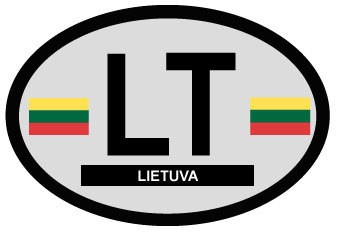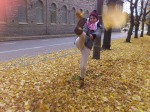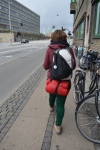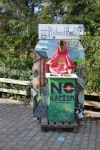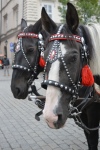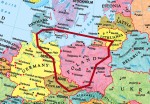The website welovelithuania gathers some beautiful pictures took by different photographers in Lithuania. Here are some of them:
Category Archives: Discover
10 ways to recognize a Lithuanian Christmas
1. Three days of festivities
Lithuanian Christmas lasts three days. The 24th, 25th and 26th of December. So many days spent around a table wish seems very small compared to the number of dishes prepared for the occasion.

2. Kūčios
Kūčios means Christmas Eve. During this dinner, we do not eat meat, eggs or milk. The tradition also says that we can’t eat anything during this day before dinner.
3. The table plan
The table plan does not mean that you will be sitting next to the new girlfriend of your father’s cousin and you’ll be bored all night long, this plan arranges the dishes on the table, around a central chandelier. A kind of Tetris that only Lithuanians know.

4. Drawing the short straw
On a corner of the table is a straw bouquet rolled-up in newspapers. Each member of the family and guests draws a straw and compare it to those of the others. Those who has the longest one is ensured to be lucky throughout the year.
5. Like a marathon
For the Christmas Eve dinner, there must be at least 12 different dishes on the table. Every guest has to taste at least a little of each dish. They say that if someone skips one dish, he or she will not survive until the day before the next Christmas …
6. “We give thanks to you our Lord Jesus Christ”
Praying before the Christmas Eve dinner is also part of the traditions. Okay, I do not think this is only a Lithuanian tradition, but it was unusual enough for me to talk about it here.
7. A plate for the deceased
We share the ostie with all the guests around the table and also with the spirits of the dead family members thanks to a plate put in the middle of the table. This plate stays here for them during all the night.
8. The Šakotis


This is a typical cake that is eaten on 25th of December. And also for many other occasions (because it’s delicious!)
9. Married in the year!
Before eating a cold soup made from poppy seeds, we put a handful of croutons in our plate. An even number of croutons indicates that you will be a couple before the end of the year, an odd number indicates that you will remain (or become) single.
10. Some strange dishes …
Juice of currants, poppy seeds “milk”, mixed fish with bones reconstructed in the original skin of the fish, black bread with apricots, or “false” rabbit (mysterious pâté in which I still do not know if there is actually some rabbit meat …). Many original and delicious dishes you need to taste at least once in your life!
And a lot of presents!
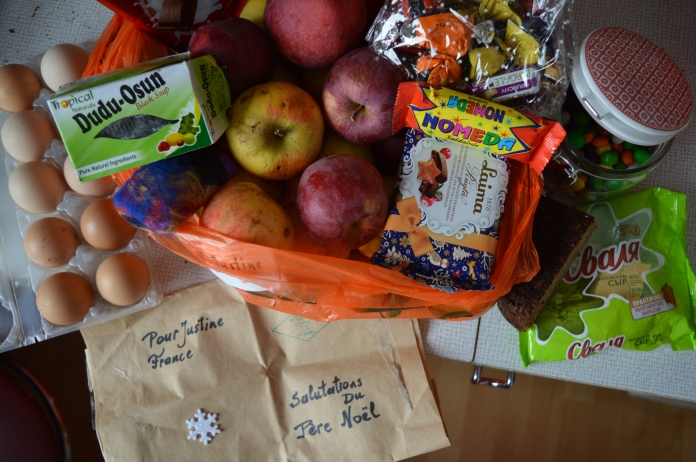
My Christmas presents: chocolate, sweets, soaps, cheese, eggs, apples, …
Linksmų Kalėdų! (Merry Christmas)
“Les Lituaniens” a book by Marielle Vitureau
 This small book written by Marielle Vitureau, journalist for Radio France Internationale and Courrier International in the Baltic states since a decade, tells the story of these people from Northern Europe. It describes the Lithuanian as dynamic, open and stubborn, committed by a rich and tragic history, from the age of the Grand Duchy of Lithuania to the Nazi and Soviet occupations. Members of the European Union since 2004, they came to the globalization, without abandoning their originality, an attachment to their roots and the pride of being still present on the world map despite their difficult history.
This small book written by Marielle Vitureau, journalist for Radio France Internationale and Courrier International in the Baltic states since a decade, tells the story of these people from Northern Europe. It describes the Lithuanian as dynamic, open and stubborn, committed by a rich and tragic history, from the age of the Grand Duchy of Lithuania to the Nazi and Soviet occupations. Members of the European Union since 2004, they came to the globalization, without abandoning their originality, an attachment to their roots and the pride of being still present on the world map despite their difficult history.
Some extracts:
“Lithuania is also deeply marked by migration, starting in the seventeenth century. Migrants, mainly for economic reasons, however, we observe since 2011, a dynamic of returns intensifies. These returns contradicts the skeptics who see these trips more like a drain than a migration. But thanks to these Lithuanians who made links during years between their country of origin and their new country, a picture of a new global society is built, where the patriotism remains a strong value. “
(Introduction)
“The Soviet Union was destroyed by rock music and jeans,” said the Czech dissident Vaclav Havel with his immense sense of catchphrases. In Lithuania, the country of the Singing Revolution, it was more than relevant. Rock music crossed Lithuania firstly with Antis, year after year, and have sapped the Communist regime in this republic, incorporated into the Soviet Union in 1944. With corrosive lyrics, the band parodied with panache the Soviet world and its vices, like the obsession for decorations applied during that time. Veterans and heroes of all kinds were weighed down under the badges stitched on their jacket. […] The name of the band was also an affront to the Soviet power. Antis has a double meaning in Lithuanian. It means “duck”, but also “disinformation”. A word chosen to protest against the brainwashing of Lithuanians for fifty years by the Soviet propaganda.”
(Le Rockeur de l’indépendance poursuit la lutte)
“Without Vilnius, city far reaches of Europe, Lithuania does not exist. Occupied by the Polishes during the interwar period, capital of a Soviet republic during the fifty years of communist occupation from 1944 to 1990, Vilnius has regained its status of capital only in 1990, when the Parliament declared its independence on March 11th. Multicultural, multiethnic, tolerant, that is how Vilnius looks like for the foreigners. A true palimpsest, narrow streets, courtyards, houses, monuments lead on the way of Lithuanians, but also and mostly Jews, Polishes and Belarusians who gave to Vilnius that reputation. Each community used to call Vilnius in his own language. In Tsarist times, from the eighteenth century to the twentieth, the Russians called the city Vilna. During the interwar period, it became Polish: Wilno. Until their extermination by the Nazis, the majority of the city residents were Jews. This great literary and intellectual center was also known as the Yiddish name, Vilne.”
(Une capitale en cache une autre)
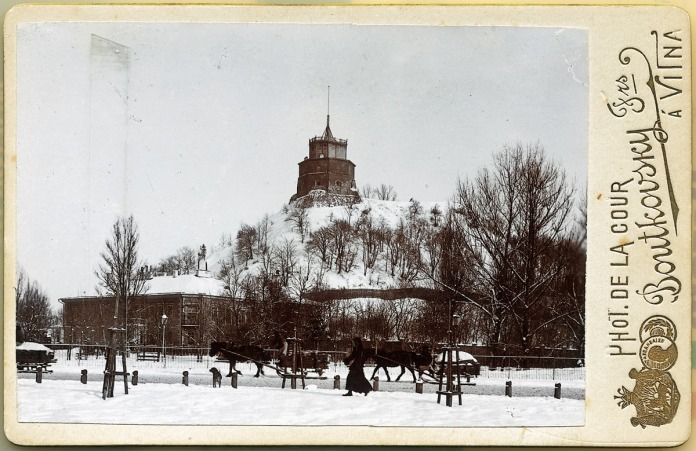
“Is globalization a danger to Lithuania?
This process is very ambivalent and every coin has another side. The positive side of globalization is the fact that a small country like Lithuania became visible and accessible, precisely because of globalization and social networks. We are visible, known, and we can travel. The most negative side is caused by the global social mobility. A stronger economy still attracts talents from one country to a weaker economy. It attracts business people, the middle class and intellectuals. These open doors have created some problem. By the way, Tomas Venclova said, that from this point of view, European Union could represent a bigger danger to Lithuania than was the Soviet Union, because the first one is free and without borders. So there is no other solution than creating a prosperous and attractive country. “
(interview of Leonidas Donskis, philosopher and teacher)
Sounds of Vilnius


“Kita stotelė: Stotis” means “next stop: station” and that’s what I hear almost every day in the buses and trolleybuses of Vilnius. The sounds of the city are very familiar to me now, so I do not hear them anymore. The journalist Marielle Vitureau had the idea to record these sounds that reflect the atmosphere of Vilnius. Then she gathered them on this virtual map: www.kitastotelestotis.lt
Video: the Sandra’s experience in a wheelchair
We started this project one month ago with Sandra, my Spanish colleague, now the video is online on youtube and facebook.
The idea was that a valid person moves around in Lithuania in a wheelchair, to report in a video the difficulties that disabled people can find on their way. We took one wheelchair, gloves (very important!), 2 cameras and a microphone, and we went to discover Lithuania, by trains, buses, sidewalks and pedestrian streets.
A 26-minute video documentary shows how is the accessibility in the three largest Lithuanian cities: Kaunas, Klaipeda and Vilnius.
Subtitles here ![]()
Through this adventure, we saw some problems in the public area, the problems that we do not see usually with our eyes of able-bodied people. We needed to see it from a wheelchair to understand how the cities are full of obstacles: broken elevators, special elevators that nobody knows how to use, pavements with stairs, cobbled pedestrian roads, lack of ramp to enter in a restaurant or a coffee place, or non-adapted toilets. Fortunately, all the time, we could see the generosity of people around us. In this way, we saw as well how disabled people are vulnerable and dependent on others.
A rich learning experience for us, wich had showed us how the infrastructure could be improved in the public areas, to make cities accessible to all.
Second religion of Lithuania: Basketball
 I had already noticed that the Catholic religion occupies an important place in Lithuania (about 79% of the population is catholic). Much more than in France for exemple. But speaking about the “religion of basketball”, no other country can compete. Basketball in Lithuania is somehow equivalent to tango in Argentina, cricket in England or cheese in France!
I had already noticed that the Catholic religion occupies an important place in Lithuania (about 79% of the population is catholic). Much more than in France for exemple. But speaking about the “religion of basketball”, no other country can compete. Basketball in Lithuania is somehow equivalent to tango in Argentina, cricket in England or cheese in France!
So when we had had the opportunity to go to see a match in Kaunas, it was an occasion to discover why this sport is so important here. This game was between Kaunas (LT) and Barcelona (ES). My Catalan roomate, of course, really wanted to go and support her team. That is how she brang me there, and how I came to support happily the Kaunas team. With a Barcelona’s and a Kaunas’ flags on our cheeks, we are ready to go to listen the big wave of the Lithuanian supporters. We do not know any song that they are singing but fortunately, we reconize something like “LIE-TU-VA! LIE-TU-VA! ” and so we can reach the movement for one moment.
The game is starting and we can enjoy the mood and learn the rules that we don’t even know … We see the game at about 1 km far away from us because we bought the last seats, and the cheapest ones. The Barcelona’s team takes the advantage. Lithuanian whistle more and more, while my Catalan neighbor is shouting in Spanish to encourage her team (so bad that she was almost alone, I think the players did not hear her). Her applause also is not in the same time as all the stadium wich make laugh our Lithuanian neighbors supporting Kaunas.
At the end, Barcelona wins 78-85, and all Kaunas is crying except us, the heterogeneous supporters.
Video of the match:
On the Baltic Sea
For five days I enjoyed the fresh and cold air of the Baltic Sea, on a St Peters’line cruise ship. Once again with Sandra (do not change a winning team), we go to visit some beautiful cities of northern Europe: Tallinn, St Petersburg, Helsinki and Stockholm.
We sail by night and arrive every morning in a different city. The first one we visit is St Petersburg.
- Autumn is here!
- Royal breakfast in Tallinn – with my new shoes I’m ready for the Russian temperatures!
- Church of the Savior on Spilled Blood
- Sandra is happy because our feet are not frozen yet!
- fisherman
- Matryoshka dolls
- and for everybody …
- Russian Burger King
The next day we arrive in Helsinki, Finland. It’s still cold (about 5°C) but we walk a lot, which is a perfect solution against cold. And we have only few hours to visit each city so we hurry, we almost run so that we do not miss the ship’s departure …
Next stop, Stockholm, beautiful city that was discovered with the sun!
- boats
- boats
- boats again
- amusement park almost on water
- the artist Niki De Saint Phalle
- coming back on our ship
Then we come back on board for the last time, we reach our starting point, Tallinn. From here, we take a bus to go to Vilnius.
2000 km hitchhiking around Europe
Firstly, we take a plane from Kaunas to Copenhagen for 5€. The offer was attractive… We took an one way ticket because we thought that it might be interesting to come back by the road and visit some cities along our way.
Day – 1 Copenhagen
We realized imediatly that this city is not suitable for our volunteer’s salary... In the city, everyone moves by bike, for us, it’s by foot. On our way, we meet Nicola, another volunteer in Lithuania who is Italian. With him, we visit the neighborhood of Christiania, a self-proclaimed “free city of Christiania” founded in 1971.
- walking with her house on her back
- Christiania
- Christiania
- Christiania
- Christiania
- Christiania
- curry sauce toast
- Christiania’s lights
- Christiania’s lights
Day – 2 & 3: Hamburg
After a complete day hitchhiking and takin 3 or 4 different cars, we arrive in Hamburg, where our couchsurfing host is waiting for us. We arrived quite late, around 23 pm, but anyway he kindly opened his door. The day after we visited Hamburg and the harbour, wich is the largest in Europe!
- On the road
- The border – Denmark / Germany
- Police boat in Hamburg
- harbour
- The shoes of my travel teammate glued again (but it does not work ..)
- And so, she is upset
Day – 4 & 5: Berlin
The fourth day of our travel, we wake up early to reach Berlin. We take some advices from the website “hitchwiki” (website listing tips for hitchhikers) and then, we start to hitchhinke again. Luckily, we find a driver who is going directly from Hamburg to Berlin. He is a musician, listening to loud rock music, and driving an old Volkswagen T3. Music for the mood!
Arrived in Berlin early enough, we have time to visit a little before to join our host, a Polish girl who have made few years ago an EVS (European Voluntary Service) in Germany and who works now in Berlin. The day after we visit the city, we go to a museum (culture is important!), we walk in the streets (a lot!), we take sometimes the metro without paying our tickets and, of course, we get control and penalty … Anyway, after that, we pay every transport ticket and we finally reach the famous Berlin Wall by night.
- on the way of Berlin
- our magic car
- so happy!
- in the streets of Berlin
- music
- Berlin
- Brandburg door
- a bar-bike (doing sport while drinking beer, the smartest way to do sport in my opinion!)
- Berlin Wall
- Berlin Wall
- Berlin Wall
- Berlin Wall
- Berlin Wall
- Berlin Wall
Day – 6 & 7: Prague
Around 9 am, we start to hitchhinke. Unfortunately, we are not in the right direction to go to Prague … So we try somehow to get out of the city towards the south, but nothing works. We waited more than 4 hours before that someone takes us on the way. This car is going to Dresden, in southern Germany, with 2 men and 1 girl. We understand after many questions about Europe and about our European Voluntaring, that the second man is actually a member of the European Parliament.
In Dresden, it is already night when we arrive. We start to be a bit desperate, but after about 30 minutes, a car stops to bring us directly to Prague.
We arrive in the center of Prague so late that we decide to go directly to party in the old town to discover the atmosphere of the city by night.
- Prague
- Prague
- an alley too narrow for two pedestrians
Day – 8 & 9: Krakow
For the 8th day, it is difficult again to get out of the city and find a transport to reach Poland from Prague. We first made a stop in Brno (CZ), and then we take a car going to Krakow, that we share with a Dutch hitchhiker. We have the same destination so we take twice the same car. In Krakow, we arrived very late, as usual, and we almost slept in the street because our couchsurfing host was tired to wait for us. Finally, he accepts anyway to host us in his flat. Good news according to the temperature outside. The day after, we visit the Auschwitz camp located near to Krakow.
- Our view from the flat
- original meeting
- Piece of art or game for children? (Sandra only knows)
- in the streets of Krakow
- big potatoe with a lot of good things inside 🙂
Day – 10: Warsaw and Kaunas
This is already the last day of our trip. We leave Krakow quite late because I lost my phone the day before in a bus, and we move heaven and earth during hours trying to find it. The bus station’s information point does not have any information for us, the bus drivers give me the phone number of the company that I can call (if luckily, I had my phone of course …) and the public telephone works with a prepaid card, but nobody knows where I can buy it. Fortunately, my team mate is a very helpful Spanish girl (a little bit smarter than me!) who convinced me to stay at the location of the bus we took the day before. And … magic! She comes back from a bus with my phone in her hand!
Then, finally, we can continue our way to Warsaw, and then to Kaunas in Lithuania. As fast as possible because we don’t have other free days anymore.
After hours and hours on the road, all day, all night, we reach Kaunas. Tired but alive …
- Our sign to come back to Lithuania
- Arrived in Kaunas, we need to rest …
- Our travel
Rainbow Gathering – the European hippie gathering
This year the European Rainbow Gathering gathered hippies and other supporters of the peace in the Lithuanian countryside. The place was a huge field, near to a lake, surrounded by hills, between the villages of Antazave and Alexandrazave in the region of Zarasai.
The Rainbow Gathering exists since 1972, the first was organised in Colorado. Basically, it happens one month a year in a self-managed community, each year in a different country. The people defends the values of peace, love, respect of nature, harmony and freedom. The participants seek to serve as an alternative to consumerism and capitalism. There are teaching and learning workshops for free, no leader, everyone participates how he can, cooking, teaching something to others, building something useful to the community, for example in Lithuania, a group of Finnish people built a sauna in a teepee near to the lake .
All the food is shared. There is a “Magic Hat” circulating after meals in which each one put money as much as he can, and there is food for a thousand of people. There are also some rules regarding safety and hygiene: alcohol, drugs and dogs are prohibited on the camp. There are outdoor toilets (a trench in the middle of the forest), and the drinking water comes from a well. Participants come with their tent, but there are also large tipis available for “homeless” people where you can make a fire (in Lithuania, even in August, the nights are cold!).
- terrain de volley
Galapagai – Music festival in Zarasai
Since one week, I am living in a new city, in northeast of Lithuania, Zarasai.
8,000 inhabitants, 7 lakes, more than 300 lakes in all the region!
The first weekend after I came, there was already a festival: Galapagai. My host organization was involved in this festival, for another project than Social Taxi. They came for the project “Human Library” and they offered me to join them.
The event happened on the island of the largest lake of Zarasai.



